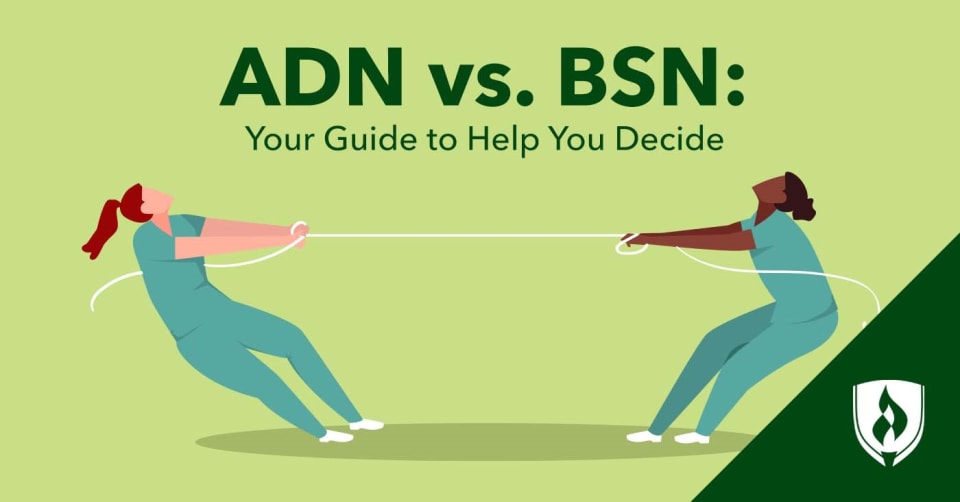
You’ve been thinking about a career in nursing for a while now. It’s something you’ve always wanted—a steady and reliable career that puts food on the table and also allows you to live out your passion for helping others. But you’re not one to make uneducated decisions. You want to know what you’re getting into—and how to best go about it.
That’s where your dilemma comes in: The ADN versus BSN debate. Should you get your Associate’s degree in Nursing (ADN) or Bachelor of Science in Nursing (BSN) to become a nurse? Graduates from ADN and BSN programs both become registered nurses (RNs) upon graduating and meeting all other state licensure requirements like passing the NCLEX-RN® exam. But what differences come with these degrees? And which degree path is best suited for you?
Let’s explore the ADN versus BSN debate so you can get your wheels in motion.
ADN vs. BSN: Education
No matter the route you take to become a registered nurse, you’ll need to pass the NCLEX-RN exam. This critical licensure exam is taken after graduating from a nursing program and is likely to be your final hurdle to obtaining those credentials. But what about the nursing programs you’ll choose from?
As we mentioned, there are multiple paths to the same role. One big difference between an ADN and BSN program is the length of time it typically takes to complete each option. The Professional Nursing ADN program at Rasmussen University can be completed in as few as 21 months.1 BSN programs typically take longer to complete, with students being able to finish the standard BSN degree at Rasmussen University in as few as 33 months.1
Some nurses choose the ADN degree route in order to enter the workforce sooner, with the option to obtain a BSN later on via an RN to BSN program.
You have plenty of entrance options to a career in nursing, but one thing is for certain—whether you opt for an ADN program or a BSN program, your entry title remains the same: registered nurse.
ADN vs. BSN: Curriculum differences
Both ADN and BSN degree programs contain the core courses needed to teach you the competencies of nursing. And they both contain nursing student clinicals to provide students with hands-on learning with real patients in healthcare settings.
But BSN degree programs include some courses that aren’t in ADN degree programs. They round out their programs with an emphasis on public health, management and leadership, nursing research, and physical and social sciences. These additional courses are meant to provide students with more professional development and a heightened understanding of the issues affecting patient care and healthcare delivery.
ADN vs. BSN: Career opportunities
ADN and BSN degree graduates are both registered nurses. But do their career options differ?
As registered nurses, those with their ADN degree or BSN degree work side by side caring for patients: They administer care, update medical charts and monitor patients’ symptoms, among many other duties.
However, nurses with BSN degrees are sometimes tasked with a greater variety of duties than nurses with their ADN. The BSN degree can also open doors for leadership and management positions. Some nursing specialties, like public health, nurse education and nurse research may also require a BSN degree.
Additionally, nurses who take the BSN path have the option to pursue graduate degrees, offering further educational and career advancement. For instance, having a bachelor’s degree paves the way for enrolling in a nurse practitioner graduate program, a step needed for an advanced practice nursing career track.
ADN vs. BSN: Job outlook
Looking ahead, the nursing field is projected to grow nine percent from 2020 to 2030—which is about as fast as the eight percent average for all occupations.2
As for job prospects, aspiring nurses with their BSN tend to have more jobs to choose from. We used job posting analysis software from Burning-Glass.com to examine more than two million registered nurse job posting over the past year. We found that RNs with an associate’s degree met the minimum education requirements listed for 57 percent of those jobs, while RNs with a BSN met the education qualifications for 98 percent of the jobs advertised.3 This shows that employers are understandably more receptive to hiring nurses with additional education, but there are still plenty of opportunities out there for ADN-RNs.
ADN vs. BSN: Titles and employers
Will your degree choice impact where you can work? Somewhat.
ADN and BSN nurses are largely employed in hospitals, home healthcare services and outpatient care centers. But a nurse’s degree can also influence their employment at other locations.
BSN nurses may have an advantage if seeking employment as a school nurse, nurse educator or with insurance carriers as case managers. Additionally, administration and management-level roles may be more likely to prefer candidates with a bachelor’s degree.
Two paths, one destination
Weighing the ADN route versus the BSN route will take some careful consideration. How quickly would you like to get to work as a nurse? Do you have your sights set on one day working in an advanced practice or leadership role? Will you stay motivated enough to return if you’re considering the RN to BSN route?
Take the time to gather your thoughts on these questions before making a decision, but rest easy knowing that no matter the path you take, you’ll have an opportunity to have a positive impact on your patients’ lives—and your own—as a registered nurse.
If you’re ready to take that next step and learn more about what to expect in your nursing school experience, sign up for a Nursing Information Session today.
Related Articles:
- What is an ADN, And Does It Make Sense For Your Nursing Career Goals?
- AAS vs. ADN: What to Choose When You Want to Become a Nurse
1Completion time is dependent on the number of transfer credits accepted and courses completed each term.
2Bureau of Labor Statistics, U.S. Department of Labor, Occupational Outlook Handbook, [information accessed June 3, 2022], www.bls.gov/ooh/. Information represents national, averaged data for the occupations listed and includes workers at all levels of education and experience. Employment conditions in your area may vary.
3Burning-Glass.com (analysis of 2,217,963 registered nurse job postings, Jun. 1, 2021 – May 31, 2022).
NCLEX-RN is a registered trademark of National Council of State Boards of Nursing, Inc.




